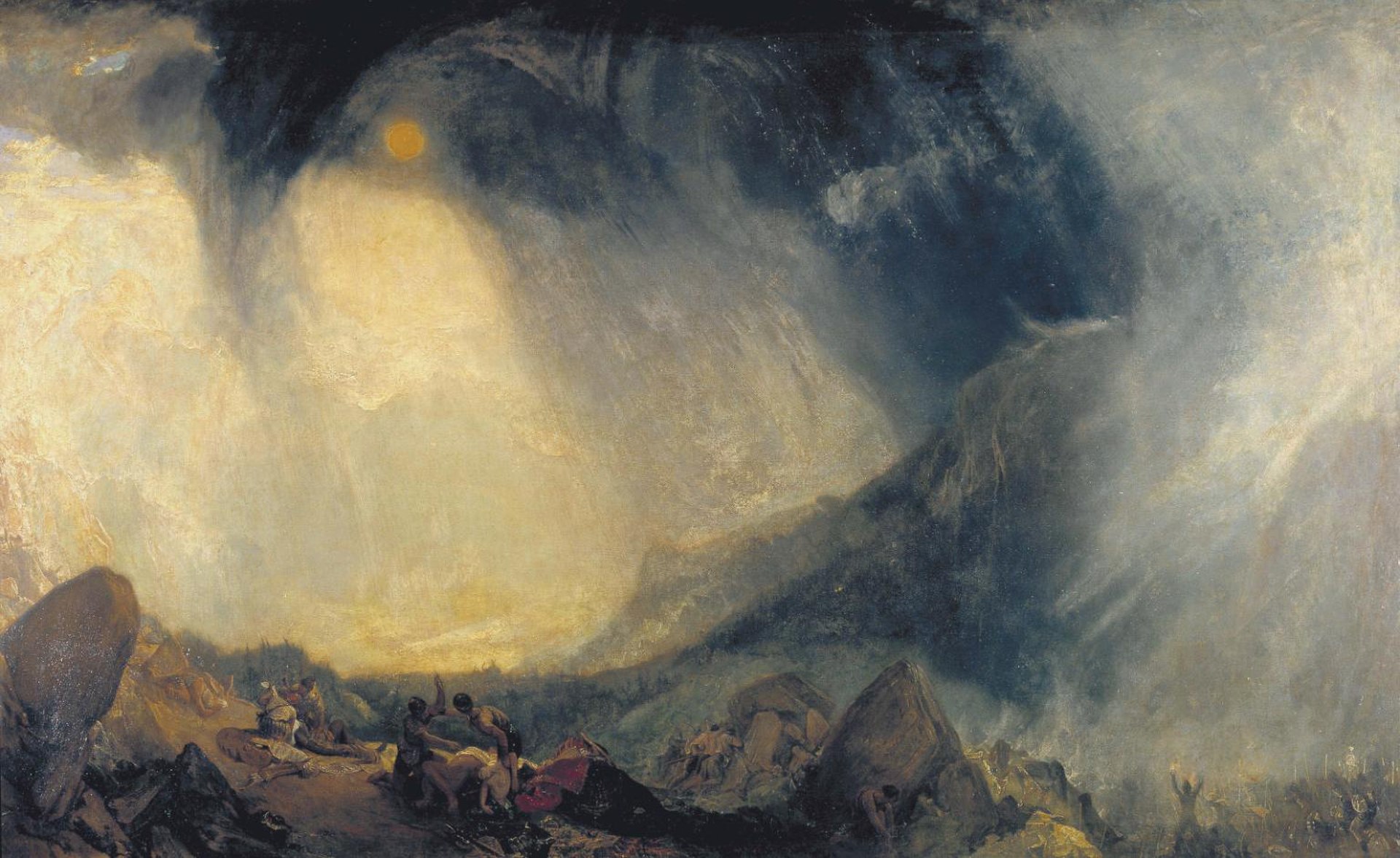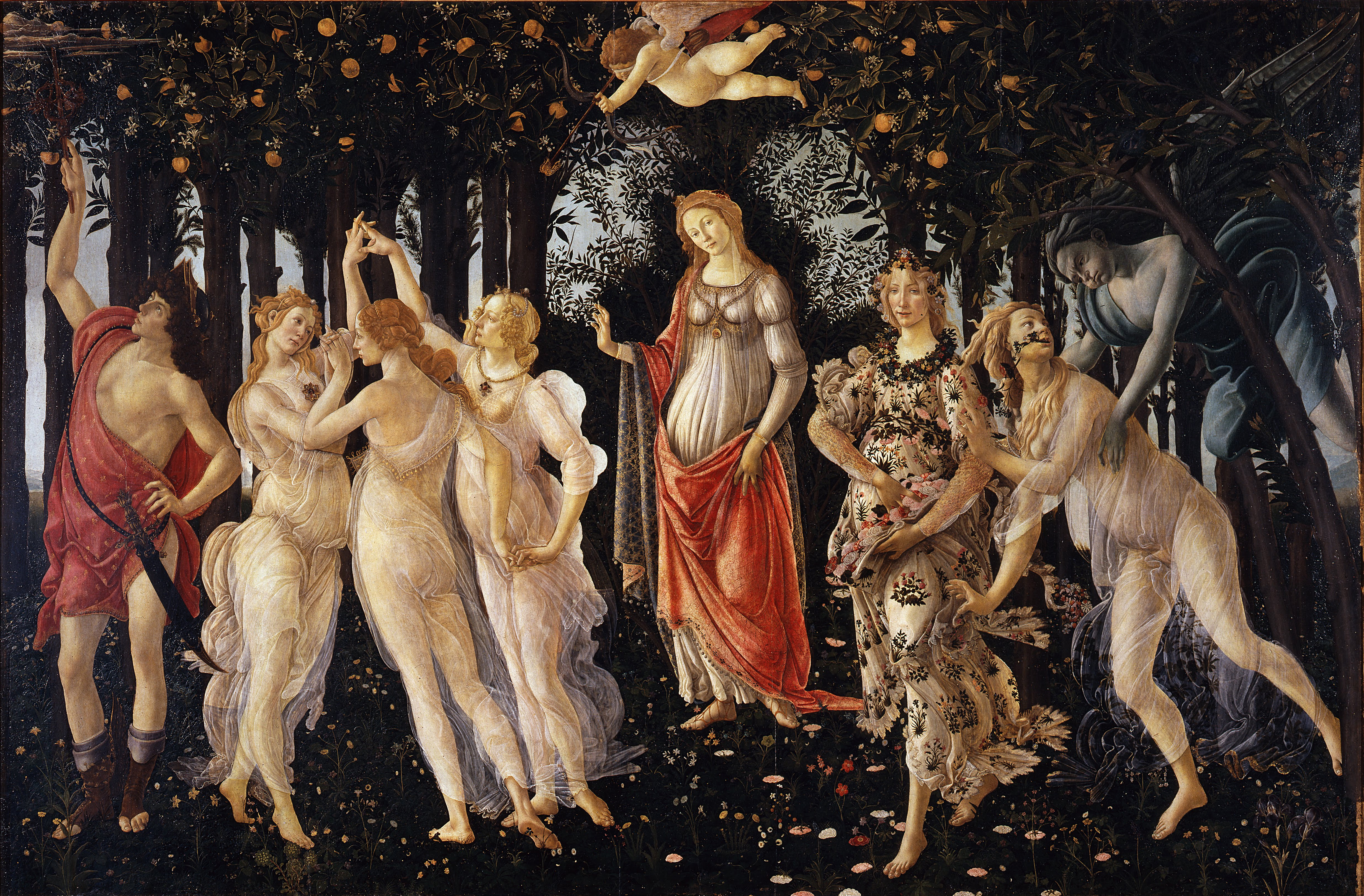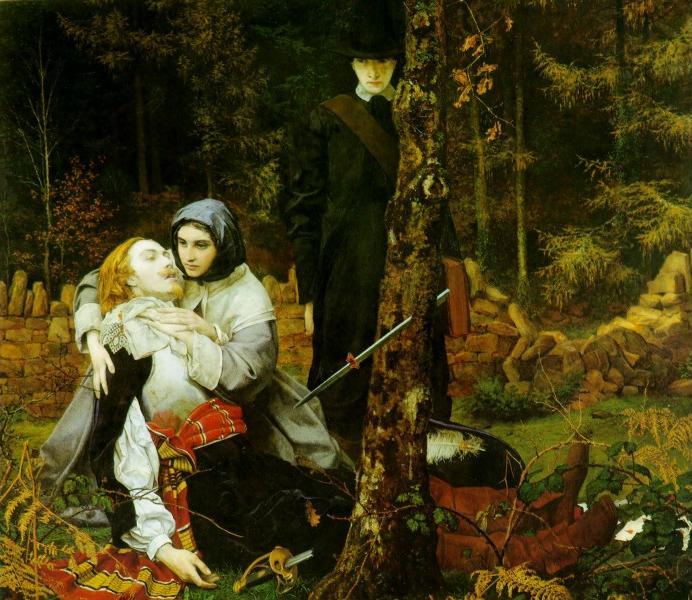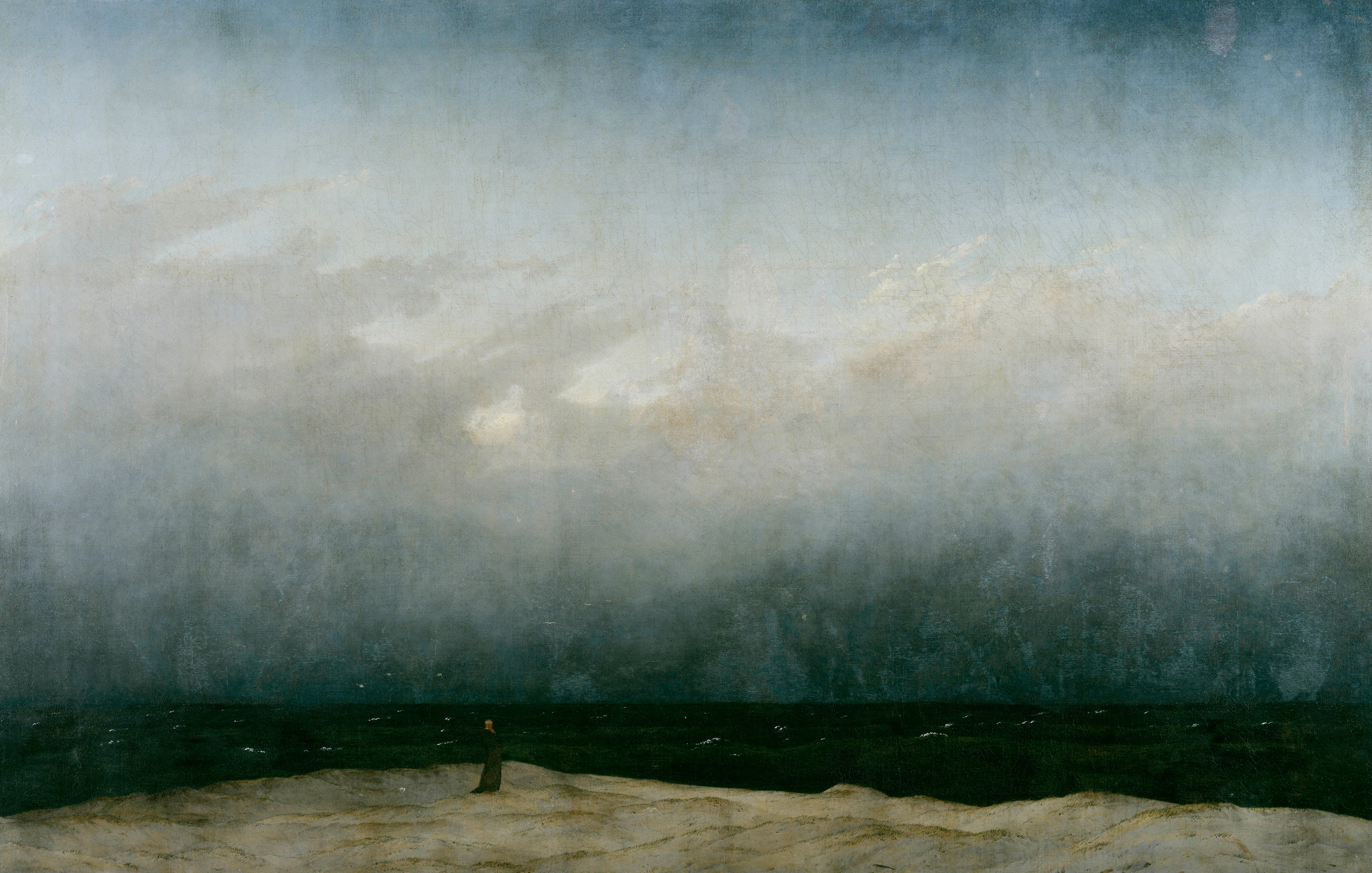“This music crept by me upon the waters”
-The Tempest

Caspar David Friedrich, Moonrise over the Sea, 1822. “We sat together at one summer’s end, That beautiful mild woman, your close friend, And you and I, and talked of poetry. I said, ‘A line will take us hours maybe; Yet if it does not seem a moment’s thought,” – Adam’s Curse, W.B. Yeats
GRRM’s namesake of the novels:
Some say the world will end in fire
Some say in ice.
From what I’ve tasted of desire,
I hold with those who favor fire.
But if it had to perish twice,
I think I know enough of hate,
To say that for destruction, Ice
Is also great and would suffice.
-Robert Frost, 1920
Of late, something has prompted the dragons and the Others and the children of the forest to return to the world in a Time of spirits and sprites. Melisandre’s power grows stronger as the red star bleeds. She uses magic to appear young and beautiful.
“When the red star bleeds and the darkness gathers, Azor Ahai shall be born again amidst smoke and salt to wake dragons out of stone. ”
– Melisandre, ASoS
Different cultures create different myths to explain the changing seasons. In the legends from the east in GRRM’s world, the Maiden-Made-of-Light turned her back upon the world, ushering in the Long Night. Demeter (Ceres) compromised with Hades to allow her daughter Persephone to return from Hell to bring spring and water.
Tempus fugit: “Rough winds do shake the darling buds of May. And summer’s lease hath all too short a date.”
The Tempest: “What’s past is prologue”

Vanitas Still Life with Self-Portrait, Pieter Claesz, 1628. PROSPERO: “Ariel, thy charge Exactly is perform’d: but there’s more work. What is the time o’ the day? ARIEL Past the mid season. PROSPERO At least two glasses. The time ‘twixt six and now Must by us both be spent most preciously.” -The Tempest 1.2
The magic of art and theater is an antidote to the vanitas, the ephemeral vanities of life. Glass candles can keep burning, flowers do not fade, cups do not run dry, the hourglass never empties and the music never ceases. The plot of The Tempest perfectly obeys the unity of Time, place, and action. The Winter’s Tale is a violation of this convention: there is a sixteen year gap in the play and we travel from Bohemia to Sicily. Such conventions formed a hierarchy of genres with epics tragedies, histories- high, comedies and satires- low. Romances like The Winter’s Tale and The Tempest are less concerned with the young lovers than they are with multiple generations and the genres mingle. Magic is required by both plots.
That is no country for old men. The young
In one another’s arms, birds in the trees
—Those dying generations—at their song,
The salmon-falls, the mackerel-crowded seas,
Fish, flesh, or fowl, commend all summer long
Whatever is begotten, born, and dies.
Caught in that sensual music all neglect
Monuments of unageing intellect.
-Sailing to Byzantium, W. B. Yeats
A sad tale is best for The Winds of Winter
“ A sad tale’s best for winter: I have one
Of sprites and goblins.”-Mamillius in The Winter’s Tale.
Magic allows for a Time for sprites and goblins in The Winter’s Tale. In the Age of Romanticism, the Sublime meant making you feel close to death in paintings of shipwrecks and tempests and goblins stomping over the universe in Beethoven’s Fifth Symphony in Howard’s End:
“It will be generally admitted that Beethoven’s Fifth Symphony is the most sublime noise that has ever penetrated into the ear of man. All sorts and conditions are satisfied by it. Whether you are like Mrs. Munt, and tap surreptitiously when the tunes come– of course, not so as to disturb the others–or like Helen, who can see heroes and shipwrecks in the music’s flood; or like Margaret, who can only see the music; or like Tibby, who is profoundly versed in counterpoint, and holds the full score open on his knee; or like their cousin, Fraulein Mosebach, who remembers all the time that Beethoven is echt Deutsch; or like Fraulein Mosebach’s young man, who can remember nothing but Fraulein Mosebach: in any case, the passion of your life becomes more vivid, and you are bound to admit that such a noise is cheap at two shillings.[..]
“Would it be some young man or other whom she takes an interest in?”
“I expect so,” Helen replied. Music enwrapped her, and she could not enter into the distinction that divides young men whom one takes an interest in from young men whom one knows.
“You girls are so wonderful in always having–Oh dear! one mustn’t talk.”
For the Andante had begun–very beautiful, but bearing a family likeness to all the other beautiful Andantes that Beethoven had written, and, to Helen’s mind, rather disconnecting the heroes and shipwrecks of the first movement from the heroes and goblins of the third. She heard the tune through once, and then her attention wandered, and she gazed at the audience, or the organ, or the architecture. Much did she censure the attenuated Cupids who encircle the ceiling of the Queen’s Hall, inclining each to each with vapid gesture, and clad in sallow pantaloons, on which the October sunlight struck. “How awful to marry a man like those Cupids!” thought Helen. Here Beethoven started decorating his tune, so she heard him through once more, and then she smiled at her Cousin Frieda. But Frieda, listening to Classical Music, could not respond. Herr Liesecke, too, looked as if wild horses could not make him inattentive; there were lines across his forehead, his lips were parted, his pince-nez at right angles to his nose, and he had laid a thick, white hand on either knee. And next to her was Aunt Juley, so British, and wanting to tap. How interesting that row of people was! What diverse influences had gone to the making!
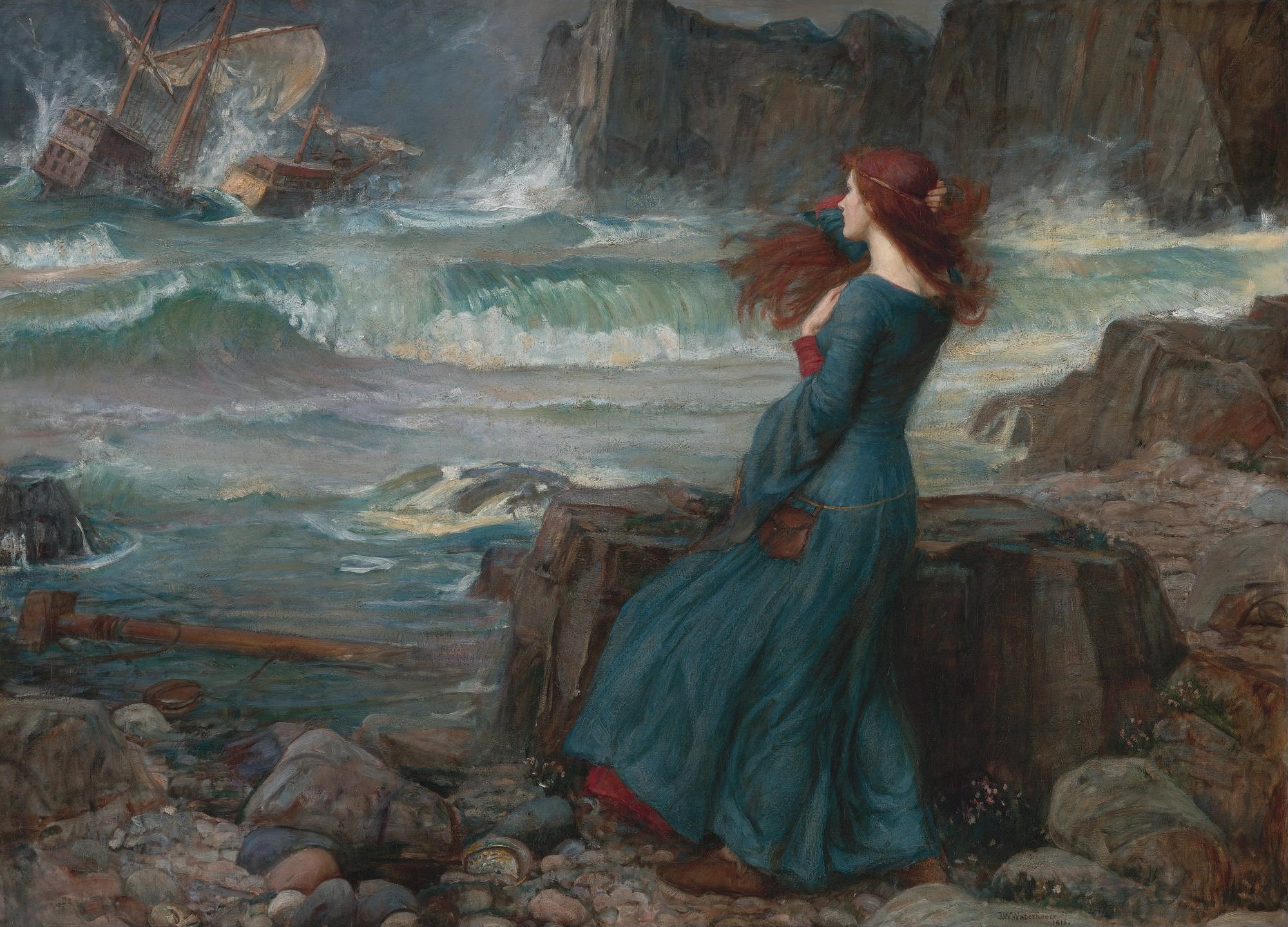
Miranda, The Tempest, John William Waterhouse 1916. MIRANDA: “Oh, wonder! How many goodly creatures are there here! How beauteous mankind is! O brave new world, That has such people in ’t!”
Here Beethoven, after humming and hawing with great sweetness, said “Heigho,” and the Andante came to an end. Applause, and a round of “wunderschoning” and pracht volleying from the German contingent. Margaret started talking to her new young man; Helen said to her aunt: “Now comes the wonderful movement: first of all the goblins, and then a trio of elephants dancing”; and Tibby implored the company generally to look out for the transitional passage on the drum.
“On the what, dear?”
“On the drum, Aunt Juley.”
“No; look out for the part where you think you have done with the goblins andthey come back,“ breathed Helen,
as the music started with a goblin walking quietly over the universe, from end to end.
Others followed him. They were not aggressive creatures; it was that that made them so terrible to Helen. They merely observed in passing that there was no such thing as splendour or heroism in the world. After the interlude of elephants dancing, they returned and made the observation for the second time. Helen could not contradict them, for, once at all events, she had felt the same, and had seen the reliable walls of youth collapse.
Panic and emptiness! Panic and emptiness! The goblins were right.
Her brother raised his finger; it was the transitional passage on the drum.
For, as if things were going too far, Beethoven took hold of the goblins and made them do what he wanted. He appeared in person. He gave them a little push, and they began to walk in a major key instead of in a minor, and then–he blew with his mouth and they were scattered! Gusts of splendour, gods and demigods contending with vast swords, colour and fragrance broadcast on the field of battle, magnificent victory, magnificent death! Oh, it all burst before the girl, and she even stretched out her gloved hands as if it was tangible. Any fate was titanic; any contest desirable; conqueror and conquered would alike be applauded by the angels of the utmost stars.
And the goblins–they had not really been there at all? They were only the phantoms of cowardice and unbelief? One healthy human impulse would dispel them? Men like the Wilcoxes, or ex-President Roosevelt, would say yes. Beethoven knew better. The goblins really had been there. They might return–and they did. It was as if the splendour of life might boil over and waste to steam and froth. In its dissolution one heard the terrible, ominous note, and a goblin, with increased malignity, walked quietly over the universe from end to end. Panic and emptiness! Panic and emptiness! Even the flaming ramparts of the world might fall. Beethoven chose to make all right in the end. He built the ramparts up. He blew with his mouth for the second time, and again the goblins were scattered. He brought back the gusts of splendour, the heroism, the youth, the magnificence of life and of death, and, amid vast roarings of a superhuman joy, he led his Fifth Symphony to its conclusion. But the goblins were there. They could return. He had said so bravely, and that is why one can trust Beethoven when he says other things.
Helen pushed her way out during the applause. She desired to be alone. The music had summed up to her all that had happened or could happen in her career.
She read it as a tangible statement, which could never be superseded. The notes meant this and that to her, and they could have no other meaning, and life could have no other meaning. She pushed right out of the building and walked slowly down the outside staircase, breathing the autumnal air, and then she strolled home.”–Howard’s End, E. M. Forster, 1910. Chapter V
Grendel, in John Gardner’s 1971 novel told from the perspective of the monster in Beowulf, philosophizes on Time and beauty.
“O the ultimate evil in the temporal world is deeper than any specific evil, such as hatred, or suffering, or death! The ultimate evil is that Time is perpetual perishing, and being actual involves elimination. The nature of evil may be epitomized, therefore, in two simple but horrible and holy propositions: ‘Things fade’ and ‘Alternatives exclude.’ Such is His mystery: that beauty requires contrast, and that discord is fundamental to the creation of new intensities of feeling. Ultimate wisdom, I have come to perceive, lies in the perception that the solemnity and grandeur of the universe rise through the slow process of unification in which the diversities of existence are utilized, and nothing, ‘nothing’ is lost.”
The Pastoral Concert
PERDITA …You’re welcome, sir.
Give me those flowers there, Dorcas. Reverend sirs,
For you there’s rosemary and rue; these keep
Seeming and savour all the winter long:
Grace and remembrance be to you both,
And welcome to our shearing!
POLIXENES
Shepherdess,
A fair one are you–well you fit our ages
With flowers of winter.
PERDITA
Sir, the year growing ancient,
Not yet on summer’s death, nor on the birth
Of trembling winter, the fairest
flowers o’ the season
Are our carnations and streak’d gillyvors,
Which some call nature’s bastards: of that kind
Our rustic garden’s barren; and I care not
To get slips of them.
POLIXENES
Wherefore, gentle maiden,
Do you neglect them?
PERDITA
For I have heard it said
There is an art which in their piedness shares
With great creating nature.
POLIXENES
Say there be;
Yet nature is made better by no mean
But nature makes that mean: so, over that art
Which you say adds to nature, is an art
That nature makes. You see, sweet maid, we marry
A gentler scion to the wildest stock,
And make conceive a bark of baser kind
By bud of nobler race: this is an art
Which does mend nature, change it rather, but
The art itself is nature.
PERDITA
So it is.
POLIXENES
Then make your garden rich in gillyvors,
And do not call them bastards.
PERDITA
I’ll not put
The dibble in earth to set one slip of them;
No more than were I painted I would wish
This youth should say ’twere well and only therefore
Desire to breed by me. Here’s flowers for you;
Hot lavender, mints, savoury, marjoram;
The marigold, that goes to bed wi’ the sun
And with him rises weeping: these are flowers
Of middle summer, and I think they are given
To men of middle age. You’re very welcome.
CAMILLO
I should leave grazing, were I of your flock,
And only live by gazing.
PERDITA
Out, alas!
You’d be so lean, that blasts of January
Would blow you through and through.
Now, my fair’st friend,
I would I had some flowers o’ the spring that might
Become your time of day; and yours, and yours,
That wear upon your virgin branches yet
Your maidenheads growing: O Proserpina,
For the flowers now, that frighted thou let’st fall
From Dis’s waggon! daffodils,
That come before the swallow dares, and take
The winds of March with beauty; violets dim,
But sweeter than the lids of Juno’s eyes
Or Cytherea’s breath; pale primroses
That die unmarried, ere they can behold
Bight Phoebus in his strength–a malady
Most incident to maids; bold oxlips and
The crown imperial; lilies of all kinds,
The flower-de-luce being one! O, these I lack,
To make you garlands of, and my sweet friend,
To strew him o’er and o’er!
FLORIZEL
What, like a corse?
PERDITA
No, like a bank for love to lie and play on;
Not like a corse; or if, not to be buried,
But quick and in mine arms. Come, take your flowers:
Methinks I play as I have seen them do
In Whitsun pastorals: sure this robe of mine
Does change my disposition.
FLORIZEL
What you do
Still betters what is done. When you speak, sweet.
I’ld have you do it ever: when you sing,
I’ld have you buy and sell so, so give alms,
Pray so; and, for the ordering your affairs,
To sing them too: when you do dance, I wish you
A wave o’ the sea, that you might ever do
Nothing but that; move still, still so,
And own no other function: each your doing,
So singular in each particular,
Crowns what you are doing in the present deed,
That all your acts are queens. – The Winter’s Tale, 4.4
In this pastoral concert, Florizel longs for eternal summer with his love “Perdita” whose name means “lost,” but now is found, Perdita sees art as a self-conscious corruption of nature, and crossbred flowers are compared to bastards, patched and “pied.”
Summer dies and winter is born. As plays come to life for readers and are resurrected on the stage, somehow Hermione’s statue coming to life is not a supernatural, but a natural miracle. Theater provided a secular version of transcendence that Elizabethan Protestantism, in its iconoclasm, against the idolatry, incense burning and sale of indulgences in Catholicism, did not allow. Lyanna’s resurrection will have to come naturally in the fulfillment of a prophecy and the restoration of world order.
Fruitful Resurrection

Pygmalion, Jean-Baptiste Regnault 1786
PAULINA
As she lived peerless,
So her dead likeness, I do well believe,
Excels whatever yet you look’d upon
Or hand of man hath done; therefore I keep it
Lonely, apart. But here it is: prepare
To see the life as lively mock’d as ever
Still sleep mock’d death: behold, and say ’tis well.
PAULINA draws a curtain, and discovers HERMIONE standing like a statue […]
PAULINA Music, awake her; strike!
[Music]
‘Tis time; descend; be stone no more; approach;
Strike all that look upon with marvel. Come,
I’ll fill your grave up: stir, nay, come away,
Bequeath to death your numbness, for from him
Dear life redeems you. You perceive she stirs:
[HERMIONE comes down from the pedestal]
Start not; her actions shall be holy as
You hear my spell is lawful: do not shun her
Until you see her die again; for then
You kill her double. Nay, present your hand:
When she was young you woo’d her; now in age
Is she become the suitor?
LEONTESO, she’s warm!
If this be magic, let it be an art
Lawful as eating.
Prospero, in the end of The Tempest, renounces his resurrecting powers. For everything there is a season, a Time for every activity under the heavens. Ariel conjures the spirits in Act I and Prospero forsakes the magic by Act V.
ARIEL
(sings)
Full fathom five thy father lies.
Of his bones are coral made.
Those are pearls that were his eyes.
Nothing of him that doth fade,
But doth suffer a sea-change
Into something rich and strange.
Sea-nymphs hourly ring his knell
PROSPERO
“Ye elves of hills, brooks, standing lakes and groves,
And ye that on the sands with printless foot
Do chase the ebbing Neptune and do fly him
When he comes back; you demi-puppets that
By moonshine do the green sour ringlets make,
Whereof the ewe not bites, and you whose pastime
Is to make midnight mushrooms, that rejoice
To hear the solemn curfew; by whose aid,
Weak masters though ye be, I have bedimm’d
The noontide sun, call’d forth the mutinous winds,
And ‘twixt the green sea and the azured vault
Set roaring war: to the dread rattling thunder
Have I given fire and rifted Jove’s stout oak
With his own bolt; the strong-based promontory
Have I made shake and by the spurs pluck’d up
The pine and cedar: graves at my command
Have waked their sleepers, oped, and let ’em forth
By my so potent art. But this rough magic
I here abjure, and, when I have required
Some heavenly music, which even now I do,
To work mine end upon their senses that
This airy charm is for, I’ll break my staff,
Bury it certain fathoms in the earth,And deeper than did ever plummet sound
I’ll drown my book.”
Known as Shakespeare’s Farewell to the Theater, Prospero’s Epilogue in The Tempest imitates the Lord’s Prayer as he renounces his magic, he begs, “Let your indulgence set me free.”
Now my charms are all o’erthrown,
And what strength I have’s mine own,
Which is most faint: now, ’tis true,
I must be here confined by you,
Or sent to Naples. Let me not,
Since I have my dukedom got
And pardon’d the deceiver, dwell
In this bare island by your spell;
But release me from my bands
With the help of your good hands:
Gentle breath of yours my sails
Must fill, or else my project fails,
Which was to please. Now I want
Spirits to enforce, art to enchant,
And my ending is despair,
Unless I be relieved by prayer,
Which pierces so that it assaults
Mercy itself and frees all faults.
As you from crimes would pardon’d be,
Let your indulgence set me free. – 5.1
“Words are wind,” and are brought to life by theater, therefore, “So long as men can breathe, or eyes can see, So long lives this, and this gives life to thee.” – Sonnet 18
Those are pearls that were his eyes.
“She got gold doorknobs where her eyes used to be…
She got sunset on her breath now
I inhaled just a little bit
Now I got no fear of death nowAh – It’s the magical mystery kind
Ah – must be a lie
Bye bye to the too good to be true kind of love
Oh – I could die
Oh now I can die”
-40 Day Dream – Edward Sharpe and the Magnetic Zeros

Pieter Bruegel the Elder – Hunters in the Snow 1565. AUTOLYCUS: “When daffodils begin to peer, With heigh! the doxy over the dale, Why, then comes in the sweet o’ the year; For the red blood reigns in the winter’s pale.” – The Winter’s Tale, “I was following the pack, all swallowed in their coats With scarves of red tied ’round their throats To keep their little heads from falling in the snow, and I turned ’round and there you go And Michael, you would fall and turn the white snow red as strawberries in the summertime” -Fleet Foxes, White Winter Hymnal
Tysha would sing to Tyrion,
“I loved a maid as fair as summer
- with sunlight in her hair.
I loved a maid as red as autumn
- with sunset in her hair
I loved a maid as white as winter
with moonglow in her hair.”
Vitae Summa Brevis Spem Nos Vetat Incohare Longam
by Ernest Dowson, 1896The brief sum of life forbids us the hope of enduring long. –Horace
They are not long, the weeping and the laughter,
Love and desire and hate:I think they have no portion in us after
We pass the gate.They are not long, the days of wine and roses:
Out of a misty dream
Our path emerges for a while, then closesWithin a dream.
And I shall have some peace there, for peace comes dropping slow,
Dropping from the veils of the morning to where the cricket sings;There midnight’s all a glimmer, and noon a purple glow,
And evening full of the linnet’s wings.
I will arise and go now, for always night and day
I hear lake water lapping with low sounds by the shore;
While I stand on the roadway, or on the pavements grey,
I hear it in the deep heart’s core.-from the The Lake Isle of Innisfree by W. B. Yeats
PROSPERO: We are such stuff
As dreams are made on, and our little life
Is rounded with a sleep.
Politics
By W.B Yeats.
‘In our time the destiny of man presents its meanings in political terms.’ –THOMAS MANN.
How can I, that girl standing there,
My attention fix
On Roman or on Russian
Or on Spanish politics,
Yet here’s a travelled man that knows
What he talks about,
And there’s a politician
That has both read and thought,
And maybe what they say is true
Of war and war’s alarms,
But O that I were young again
And held her in my arms.
